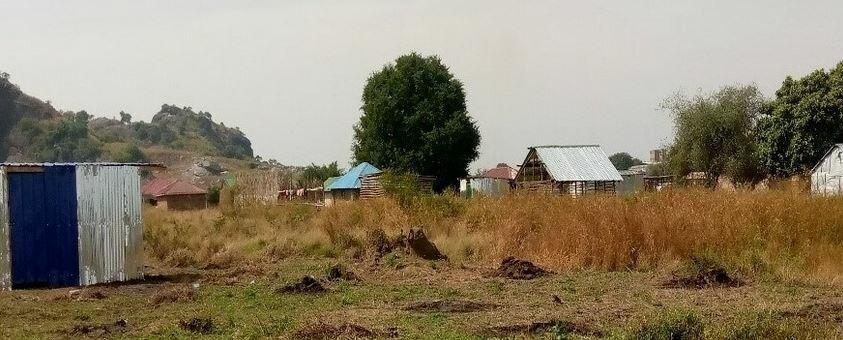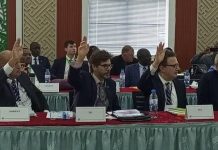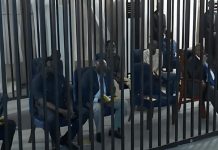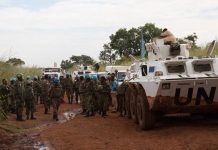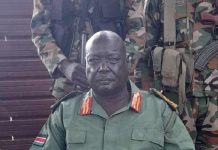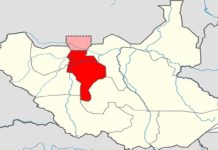JACK WERKOK
Africa-Press – South-Sudan. There has been an uproar among the Bari Community over the arrest of former Juba mayor Kalisto Ladu by law enforcement agencies in Juba. The details of the arrest remain confidential, but it could have been because of the speech that he gave during a prayer ceremony.
From watching the YouTube video, the gathering appears well-attended by mostly young women and the elderly, and a few young men sprinkled around the perimeter of the gathering. There was a pastor on the dais dressed in a white robe. Kalisto’s speech was given mostly in Juba Arabic and Bari and some English. It was not difficult to see that Kalisto displayed a sinister charisma. While the main topic of the speech dealt with land-grabbing issues, the speech delved into the politics of rebellion against the state of South Sudan by the likes of Gen. Thomas Cirillo.
Kalisto was kind to include hand gestures that appeared to show a panga or machete cutting the neck. This was about the Bible teaching that if you are slapped on the right cheek, you turn the left cheek to your assailant to be slapped instead of responding to an assault. With Kalisto, his method would be landing a machete on your neck and not turning his left cheek. It is understood by a reasonable observer that land grabbing represented a slap on the right cheek and the response as displayed by Kalisto’s gesture is violence.
Prayer meetings are ubiquitous in Juba. When I visited, I went to no less than five of these meetings. These gatherings are a way for the community to come together to pay respect to a member of the community that God has called home and to discuss salient issues affecting the community. Most of these gatherings are peaceful and meant to identify issues and ways to address them. They are also a way to meet other members of the community and catch up on the latest events. Some discuss political issues affecting the community and there is nothing wrong with utilizing these platforms or gatherings to discuss political issues. However, prayer gatherings can be potent platforms for dispensing messages that may be viewed as advocating violence for a myriad of political and or perceived societal grievances.
Land issues have become a hot topic for the Bari Community which inhabits the surrounding county where Juba is located. In most post-liberation countries, land is state property, and citizens lease those rights from the state to engage in economic activity that would propel a nation’s development. Land is a major factor of production in economic development along with labor and capital. It is therefore not based on ancestral claims but on new realities where the state is tasked with building a cohesive and economically productive society.
Imagine two parcels of land; one is vacant and one has a house with a household living there. Which of the two is more valuable? Of course, the land with a house and household is more valuable because it adds value to the real gross domestic product. If the state was to allow communities to put blanket prohibitions on the control of the land around a nation’s capital, this would place a real limit on the government’s plans to develop the country and create headaches for investors who must deal with multiple layers of bureaucracy and archaic community rules, and this would impede development. When America needed to expand westward, it did not care so much for the opinion of native Americans regarding land ownership and use. The American government removed Indians from their ancestral homes and placed them in reservations (lands that were economically unpalatable) and allowed the manifest destiny to take its course. Of course, this was an extreme case, but it worked in the sense that America acquired vast tracts of land to grow food to feed its population and the world.
Back to Kalisto’s speech. It is within his rights to point out that land distribution has been skewed towards the politically connected elements. If he had stayed within this lane, his speech would be considered protected and encouraged as a vital debate that needs to be heard. What made the speech rather dangerous is that it married the land rights claims with advocating for violent reactions to perceived land grabbing and even support for rebel outfits such as Thomas Cirillo’s.
Rebels under Thomas Cirillo have engaged in attacks along the Nimule-Juba Road and Juba-Bor Road and seasonal cattle camps. These attacks are meant to disrupt economic activities in the country and create instability across the country. Such attacks often result in the death of innocent civilians and drivers trying to make a living. They do not register as a tremor for those running the country because there is no chance that the minister of defense is going to drive to Nimule or Bor unprotected.
Kalisto’s detention was condemned by the Bari Community and even Troika (U.S., UK, and Norway). The West is keeping a report card where it has already checked off several metrics that the transitional government has not met. In that report card, it is preordained that South Sudan’s leadership has not earned a good grade and therefore elections in December 2024 will not be considered credible. The Troika condemned the arrest as another example of South Sudan’s leaders restricting civic and freedom space to express contrary views about the direction of the country. The condemnation failed to consider that the speech was rather dangerous for South Sudanese because it advocated violence wrapped in glittering salutations of land rights issues.
As election season heats up, such speeches are bound to increase and will be amplified on social media. Politicians always look for ways to gain an advantage over opponents or rally their base against opposition to score political points. It happens even in some of the greatest democracies such as the United States. The Republican Party’s flag bearer in the upcoming November 2024 elections in the U.S. has latched on to the anti-immigration rhetoric that has demonized immigrants as criminals. This issue is meant to rally his base to come out and vote.
South Sudanese politicians such as Kalisto will find an issue that resonates with their communities and make a mountain out of an anthill. This should be expected. However, politicians need to aim for a more uplifting message of hope and unity that takes the country forward rather than devolve into throwing mud to appear clean. They should tell their community members of a vision where a South Sudanese from Maban can call Werkok a home without being made to feel like an outsider. We should not aim for the identity of tribal scarifications, but the content of our character as people. This is how we build up our country. If a politician deviates from such ideals and advocates divisive issues and violence to solve them, they have abdicated their rights to free speech and therefore must deal with the consequences of their actions.
With that in mind, Kalisto still deserves the due process afforded by the law. We should also balance the need to develop a cohesive and united society rather than divide ourselves along tribal lines. Land rights claims should be civil and handled within the purview of the law.
It should not be a platform to advocate for violent reaction or support taking up arms against the state. If we campaign with the best interests of our country above all else, we should be able to navigate our first electoral process without hiccups. Even when discussing salient issues such as land rights, let us remain civil and not rally our base to embrace the worst reaction to such an issue.
source:radiotamazuj
For More News And Analysis About South-Sudan Follow Africa-Press

